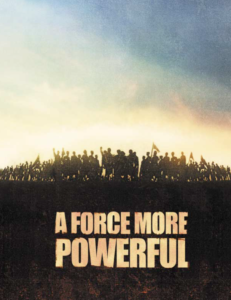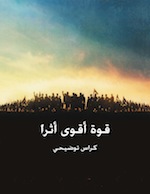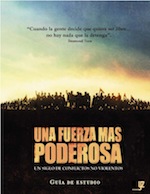A Force More Powerful is a documentary series on one of the 20th century’s most important and least-known stories: how nonviolent power overcame oppression and authoritarian rule. It includes six cases of movements, and each case is approximately 30 minutes long.
Part 1:
India
In India in the 1930s, after Gandhi had returned from South Africa, he and his followers adopted a strategy of refusing to cooperate with British rule. Through civil disobedience and boycotts, they successfully loosened their oppressors’ grip on power and set India on the path to freedom.
USA
In the 1960s, Gandhi’s nonviolent weapons were taken up by black college students in Nashville, Tennessee. Disciplined and strictly nonviolent, they successfully desegregated Nashville’s downtown lunch counters in five months, becoming a model for the entire civil rights movement.
South Africa
In 1985, a young South African named Mkhuseli Jack led a movement against the legalized discrimination known as apartheid. Their campaign of nonviolent mass action, and a powerful consumer boycott in the Eastern Cape province, awakened whites to black grievances and fatally weakened business support for apartheid.
Part 2:
Denmark
In April, 1940, German Deutsch military forces invaded Denmark. Danish leaders adopted a strategy of “resistance disguised as collaboration”—undermining German Deutsch objectives by negotiating, delaying, and obstructing Nazi demands. Underground resistance organized sabotage and strikes, and rescued all but a handful of Denmark’s seven thousand Jews.
Poland
In 1980, striking workers in Poland demanded independent unions. Using their leverage to negotiate unprecedented rights in a system where there was no power separate from the Communist Party, they created a union called “Solidarity”. Driven underground by a government crackdown in 1981, Solidarity re-emerged in 1989 as Poland’s governing political party.
Chile
In 1983, Chilean workers initiated a wave of nonviolent protests against the military dictatorship of General Augusto Pinochet. Severe repression failed to stop the protests, and violent opposition failed to dislodge the dictatorship—until the democratic opposition organized to defeat Pinochet in a 1988 referendum.
Using this Film in the Classroom



A 16-page Study Guide designed for high school and college use is offered as a free downloadable PDF file. Available in English, Arabic العربية and Spanish español .
The Study Guide contains program synopses, background information, pictures, descriptions of nonviolent strategies, maps, timelines, discussion questions, research activities, and additional resources.
There is also has a free Community Resource and Discussion Guide in English (hard copy only) and Spanish español (PDF).
Reviews and Awards
For the Television Series:
“Journalistically, A Force More Powerful brings much honor to PBS and the individuals and groups that funded the film. The film is a work of art because, first, it is a work of fact.”
–Colman McCarthy, The National Catholic Reporter
“In a time when there are so few authentic heroes, A Force More Powerful shows all of us—young and old alike—people who take principled risks far beyond their own self-interest.”
–Nat Hentoff, Syndicated Columnist
“A thoughtful new documentary that magnifies the moral victories of the 20th century… remarkable archival footage… there are no fictional characters or trumped up dialogue here; the filmmakers let participants speak in their own voices…”
–The Christian Science Monitor
“…rich in archival footage and thoughtful interviews…. The stories are inspiring, sometimes awesome.”
–The Washington Post
“Outstanding… a veritable manual on how to mount a successful nonviolent resistance movement….”
–The Los Angeles Times
“Splendid work. It explains and elucidates—just about the best missions that television can achieve.”
–The Hollywood Reporter
“…beautiful footage… this film is eloquent testimony to the power of the people’s desire to be free.”
–Time Out New York
“…this is a lovely, rich documentary… a rousing look at 90-some years of nonviolence….”
–Seattle Weekly